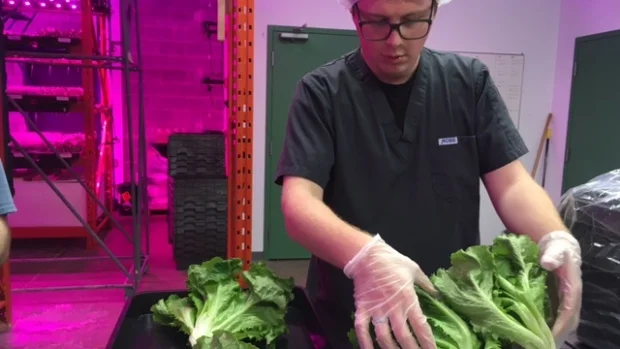New Brunswick, Canada Hydroponic Lettuce Farmer Thriving in Face of National E. coli Outbreak
New Brunswick, Canada Hydroponic Lettuce Farmer Thriving in Face of National E. coli Outbreak
Some chain restaurants pulling romaine lettuce from the menu, while others continue to serve it up
By Tori Weldon, CBC News Posted: Jan 05, 2018 6:00 AM AT Last Updated: Jan 05, 2018 10:54 AM AT
Julian Howatt weight romaine lettuce he grows hydroponically at his Moncton indoor farm, Local by Atta. He said he's been getting calls about romaine lettuce since Health Canada issued a warning in December. (Tori Weldon/CBC)
Tori Weldon | Reporter
Tori Weldon is a reporter based in Moncton. She's been working for the CBC since 2008.
Related Stories
- National E. coli outbreak has some Island businesses taking extra precautions
- Everything you need to know about the E. coli risk from romaine lettuce
- Romaine lettuce temporarily pulled from major restaurant chains
Many restaurants across the province are choosing to pull salads with romaine lettuce from their menus, in light of a E. coli outbreak linked to the leafy greens, but one Moncton bistro isn't worried about its Caesar salad.
The Public Health Agency of Canada said there have been five cases of E. coli infections in New Brunswick when it announced a national outbreak in mid-December.
Health Canada has confirmed 41 E. coli infections across the country, and the agency has linked the illness to romaine lettuce, but it still hasn't found the specific supplier as the source of the outbreak.
At Tony's Bistro, head chef Jordan Holden said he's aware of the public health warning about romaine lettuce. While he said his bistro serves about 36 kilograms of lettuce a week, he isn't concerned.
Jordan Holden, the head chef at Tony's Bistro, said he's aware of the E. coli infections in Eastern Canada but isn't concerned. The lettuce he serves is grown nearby at Local by Atta. (Tori Weldon/CBC)
"Since we're getting it locally grown, it's not really a big deal for us," said Holden.
"I've been to the plant where it comes from … I was never worried about it."
Holden buys from Local by Atta, a hydroponic, indoor farm in the Moncton Industrial Park. He tried the greens at a local farmer's market about a year ago and liked them so much he decided to serve them at his restaurant.
On Thursday, with a winter storm raging outside, Julian Howatt was warm and basking in a pink light inside his hydroponic farm. "Farm hands" wearing hair and beard nets carried trays of leafy greens up and down the stairs of the multi-level operation.
"We grow leafy greens, primarily lettuce, but also kale, microgreens, basil — that kind of stuff," Howatt said.
Holden, putting the final touches on a caesar salad at Tony's Bistro, said he might not serve romaine lettuce if it wasn't coming from :down the street. (Pierre Fournier/CBC)
He's noticed an increased interest in his product since romaine lettuce and E. coli became synonymous in the news over the last few weeks.
"We have had people ask us about romaine lettuce … more traffic on our Facebook page, people asking us questions, either about that or where they can get our products."
According to Health Canada, a common source of E. coli illness are raw fruits and vegetables that have come in contact with the feces of infected animals.
And Howatt said at his plant, "growing indoors, hydroponically like this, the risks are very low."
Chain restaurants, including Swiss Chalet, Montana's Cookhouse, Kelsey's, East Side Mario's and Boston Pizza, are pulling romaine lettuce from their menus.
In Greater Moncton, locally owned restaurants such as Vito's and the Homestead continue to serve romaine lettuce, while others, including Hynes Restaurant, have opted to temporarily remove it from the menu.
Chef Holden said he would most likely opt out of serving the lettuce if he wasn't so confident in the greens he's getting.
"I think it's a little riskier if you get it from a big supplier."
And Julian Howatt said that's the kind of confidence that comes from being able to speak with a supplier directly.


